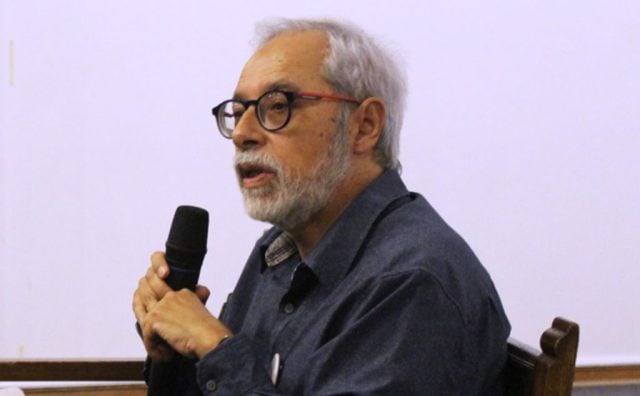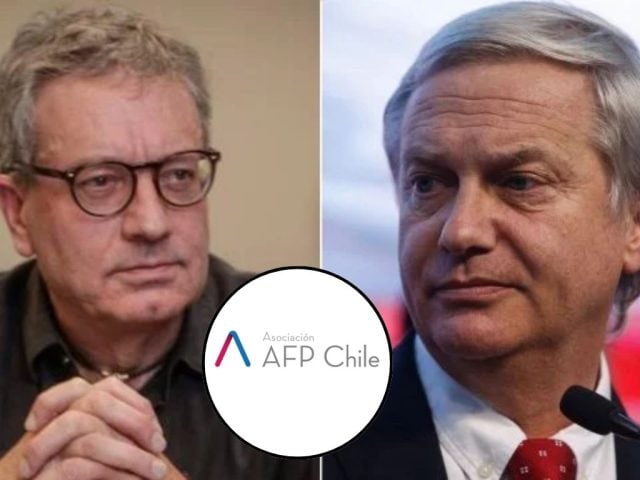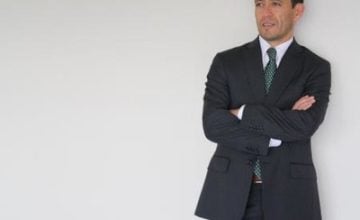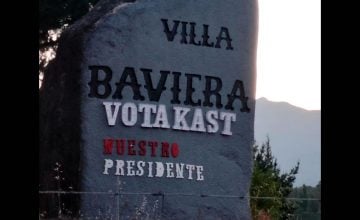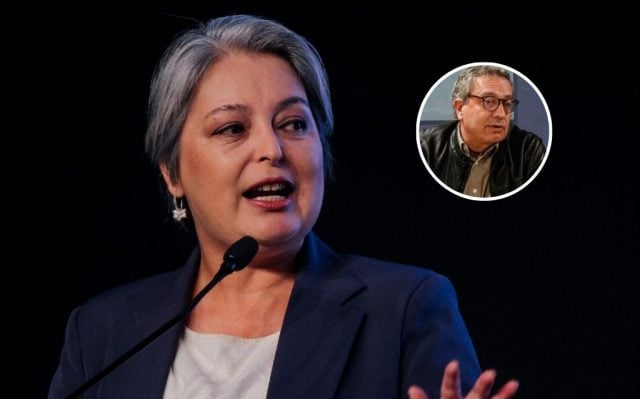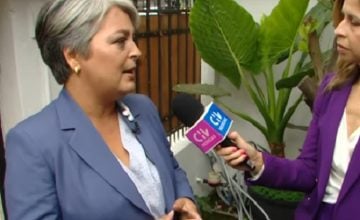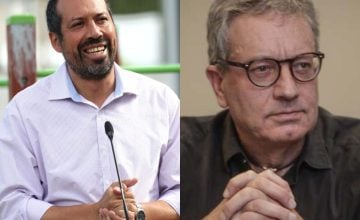During the commemoration of what would have been the 81st birthday of the late deputy Carlos Enrique Lorca Tobar, his brother Jaime Lorca Tobar, director of the Memory and Future Foundation, spoke with El Ciudadano’s La Mañanera, hosted by Javier Pineda Olcay. They discussed the political journey of Carlos Lorca, the Secretary General of the Socialist Youth at the time of the military coup, his disappearance and assassination in Colonia Dignidad, and the right-wing’s ongoing efforts to conceal and silence the crimes committed in the German enclave, which was linked to Nazi networks that operated as a center for torture and repression during Augusto Pinochet’s dictatorship.
Carlos Lorca, a psychiatrist born on November 19, 1944, served as a deputy and was a member of the Socialist Party’s Central Committee. He was abducted on June 25, 1975, by the National Intelligence Directorate (DINA) and taken to Villa Grimaldi, a clandestine detention and torture center, from which he vanished. Recent judicial investigations suggest he may have been transferred to Colonia Dignidad and murdered there.
“Carlos was killed at 33, a symbolic age, 33 years at Colonia Dignidad; they obliterated him, they burned him, shattered his bones, and sent the remains to the Perquilauquén River that runs through that fateful Colonia Dignidad,” Lorca stated.
“I speak not only as Carlos’ brother but also as director of the Memory and Future Foundation, a group of families of the disappeared political prisoners, including those socialists who resisted the military coup and steadfastly supported Salvador Allende’s popular government,” he emphasized.
In the interview with La Mañanera, he portrayed his brother as a young leader who emerged during the university reform movement of 1967-1968.
“This was around the time Che Guevara was killed in Bolivia, when Vietnam heroically resisted the American invasion, finally overcoming it ten years later, in 1974, precisely at the time Carlos was detained along with many other patriots fighting for democracy and freedom,” he recalled.
Jaime highlighted Carlos’s leadership early on, which started when he was elected president of the Medical Students’ Center at the University of Chile during a critical time when most student organizations were dominated by the Christian Democracy party. The left began to strengthen, winning control of federations and student centers in Concepción and the University of Chile, where Carlos studied medicine.
Jaime emphasized Carlos’s character, noting that “he was a very curious leader, not an agitator but a reflective leader who was the national leader of the Federation of Students of Chile (FECH) at a time when it was so powerful… On the day of victory, September 4, 1970, the FECH celebrated from the balconies at that historic site of Alameda with Santa Lucía.”
“Carlos started from there and committed himself strongly to the process of the Popular Unity government from the outset, defending it among comrades who were sometimes justifiably skeptical of the likelihood of electoral victory and the potential to build a government that adhered to its program, rather than making promises and then abandoning them,” asserted the director of the Memory and Future Foundation.
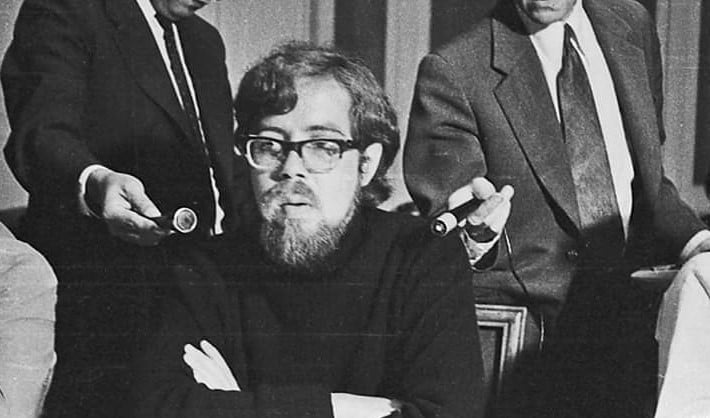
“Allende Had a Great Collaborator and Friend in Carlos Lorca”
Jaime noted that President Salvador Allende regarded Carlos as both a great collaborator and friend due to their shared socialist militancy and background in medicine. Carlos often invited Allende to the university, generating great enthusiasm, and they both were chess enthusiasts, with Carlos frequently spending weekends at Allende’s home.
“Carlos was an intellectual; he enjoyed music and reading, and he was very human, humble, and not at all addicted to the spotlight, unlike many today’s politicians,” Jaime conveyed. “That’s why I believe Carlos is still recognized and beloved by those who knew him at that time… It’s important to project this kind of figure and examples of consequence, solidarity, and commitment to new generations. Yes, there are valuable people in contemporary politics, but there is also much personal agenda, self-promotion, and a lack of collective effort, especially in engaging with the people. If you look at Carlos’s campaigns in Valdivia, where he was elected in 1973 amid the tumultuous days of March, it was evident how he was surrounded by very poor campesinos… he was always listening to people rather than just talking at them,” he recounted.
Actions Against the Rise of Denialism
In the interview with La Mañanera, Javier Pineda Olcay asked Jaime about the reflections in the Memory and Future Foundation regarding the denialism embodied by Republican candidate José Antonio Kast, and people like Johannes Keiser from the Libertarian National Party, who seek to reclaim the legacy of Pinochet’s dictatorship.
“Everyone at Memory and Future, including the left, asks ourselves, ‘How did we arrive at this point?’ I believe the answer lies in years of neglecting grassroots work and failing to propose transformative projects that resonate closely with the people, as well as a real distancing from this savage neoliberalism and capitalism, alongside the weaknesses of institutional left-wing political parties that should channel the will for transformation and connect more closely with the populace, rather than just seeking refuge in institutionalism,” Jaime Lorca stated.
“I think one must engage with institutionalism but to transform it. Engagement in government, municipalities, and parliament should be driven by the commitment that figures like Carlos Lorca held, who did not go there just to fill seats or gain favorable opinions from adversaries. They spoke to people, built organizations, raised consciousness, mobilized, and created popular power. That’s what we need to reclaim, and it must address decades of neglect in ideological and grassroots work, and not just comfortably reside in administrating institutional frameworks,” asserted the activist.
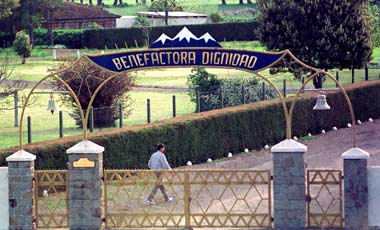
Colonia Dignidad: A “Nazi Den” with Political Protection
Addressing the nature of Colonia Dignidad, Jaime Lorca was unequivocal in labeling the enclave, founded in 1961 by the fugitive German Paul Schäfer, as a “Nazi den.”
“It was established during the presidency of Jorge Alessandri in the 1960s, and by that time it was already denounced for the abuses perpetrated against the colonists brought to this sect with a Nazi past rooted in evangelical roots. They would take the children from couples, raising them separately, and now we know that many of the hierarchy, particularly Paul Schäfer, committed abuses against these children—sexual abuse, inappropriate touching, tyranny, atrocious acts that would make Jeffrey Epstein look minor. This occurred, and in some way, they always found ways to evade justice and hide,” he explained.
He detailed how, after Salvador Allende’s government came to power, the members of the colony forged connections with the most reactionary military sectors.
“They began to establish ties with the military, particularly with the more reactionary sectors, organizing the armed formation of far-right terrorist groups… They actively resisted the popular government and democracy. When the coup started, they were already closely linked with the terrorist organization DINA, which, while officially the National Intelligence Directorate, really operated as the National Terror Directorate… They had a base there where they took prisoners, primarily from the seventh and eighth regions, including Ñuble, Maule, and Concepción, alongside some political leaders from Santiago. This includes Juan Juan Maino, a member of the United Popular Action Movement (MAPU), who was disappeared there, and his remains were never found, as well as the clandestine socialist leadership headed by Exequiel Ponce, Ricardo Lagos, Carlos Lorca, and many other valuable comrades and companions who ended up there, under conditions where we shall never find their remains,” he elaborated.
“Today they talk about a national search plan, but for us, the matter is clear; they ended their days there, and their remains were sent to the Perquilauquén River that runs through Colonia Dignidad,” he emphasized.
Slow Progress on Colonia Dignidad Expropriation Process
The director of Memory and Future expressed concern over the glacial pace of the expropriation process of Colonia Dignidad announced by President Gabriel Boric: “As of now, they haven’t done practically anything. They are suffering from frustrating bureaucratic slowness. Up to today, they haven’t even assigned appraisers to assess the 117.4 hectares of Colonia Dignidad to expropriate it and establish a memorial site in the locations where comrades were detained, disappeared, tortured, and flogged.”
He also warned of the opposition this process faces from the right.
“I hope the government feels pressured because time is ticking swiftly, and let there be no doubt, Javier Pineda, that these Nazi successors from Colonia Dignidad will do everything possible—and impossible—to prevent this expropriation and the establishment of such a memorial site, to ensure it is forgotten, as that is what they want,” he asserted.
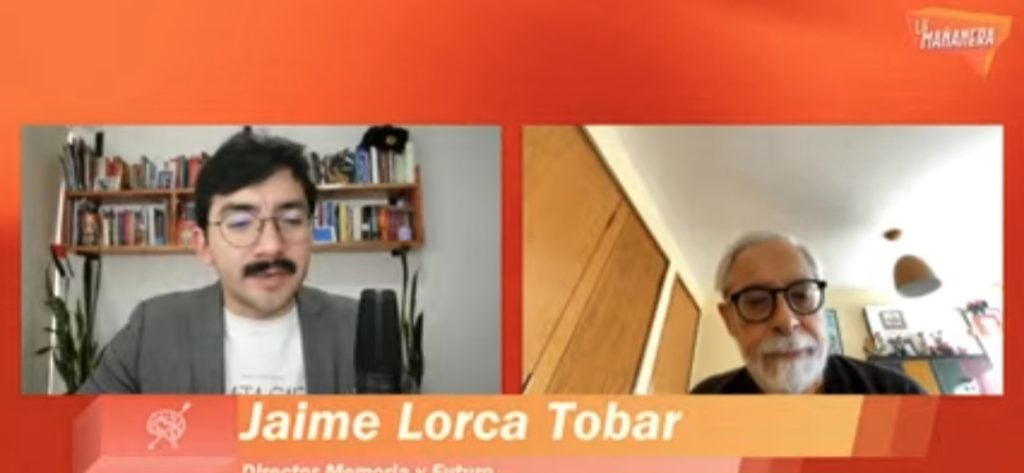
“The Far Right Defended Paul Schäfer Until the Last Minute and Now They Are Silent”
When asked about the regional and national leaders who have protected Colonia Dignidad, Jaime Lorca remarked on the complicity of the German federal state.
“The German federal government has been absolutely complicit with these people, and to this day,” he asserted.
“Despite any gestures of goodwill they may present, they have been behind a campaign to conceal and silence what happened at Colonia Dignidad, practically wiping the slate clean and acting as if we are all friends and brothers while distorting history. That is one aspect. Germany, in particular, the German government—not the German people,” he emphasized.
In Chile’s case, he referred to “the UDI at the time, the inner circle of the dictatorship, not just passive accomplices but active perpetrators. We are talking about Hernán Larraín, the late Jaime Guzmán, and all those who would visit the place for leisure, making speeches, and doing everything possible to prevent the truth from advancing and justice from being served.
Regarding the continuity of these networks of protection, Jaime Lorca stated, “the far-right defended Paul Schäfer until the last minute and now they are silent because they feel ashamed.”
However, he noted that “they have always been behind the defense and sheltering of the atrocities committed in that place.”
Some individuals, like Johannes Kaiser, have indicated that if circumstances allowed, they would recommence the same terrorist activities against the people, particularly against those who dare to resist or confront their control and barbarism.
Faced with this scenario, the social leader urged, “Let us not lose heart. We are facing a cultural shift in Chile; we must confront it with truth, reasoning, and morality, as Fidel Castro preached at the National Stadium in 1971,” he concluded.
In the broadcast on Wednesday, November 19, our director also spoke with Atilio Herrera, president of FRODESAP, regarding health expenditures in the Budget Law and primary care issues.
You can watch the complete program below:
